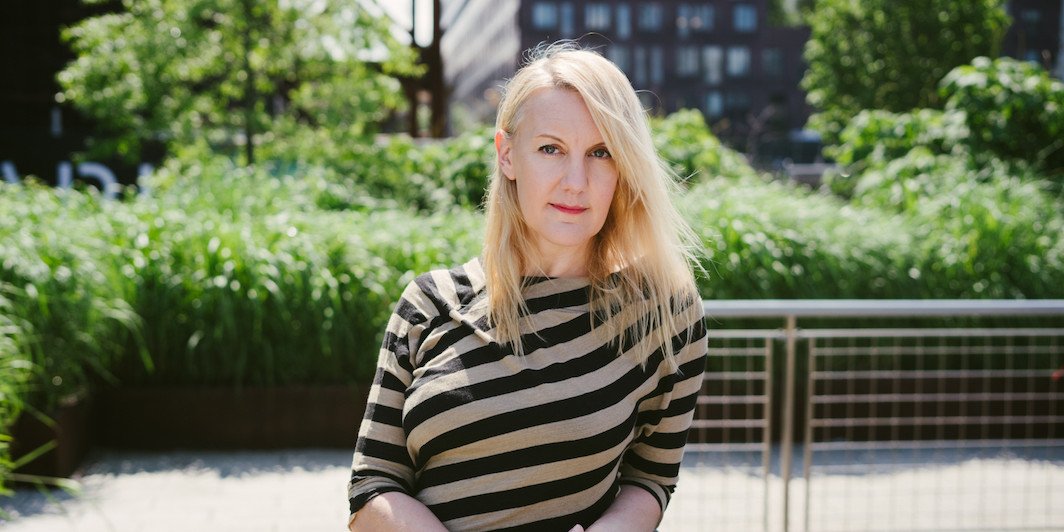John Ashbery makes an appearance in this review of Also a Poet: Frank O’Hara, My Father, and Me, a memoir by Ada Calhoun, the daughter of art critic (and friend of Ashbery) Peter Schjeldahl.
A Daughter, Her Father and the Long-Gone Poet Who Brought Them Together
In her memoir “Also a Poet: Frank O’Hara, My Father, and Me,” Ada Calhoun set out to write a poet’s biography and found a connection to her father instead.
By Casey Schwartz
June 9, 2022
In the fall of 2018, the writer Ada Calhoun went into the basement of her parents’ apartment on St. Marks Place, in Manhattan’s East Village. She was looking for old toys to give her goddaughter. What she found instead — a cache of dusty cassette tapes — would become her next book.
When she took the tapes upstairs to her father, Peter Schjeldahl, a longtime art critic for The New Yorker, he explained they were what remained of his attempt to write a biography of the poet Frank O’Hara.
Calhoun vaguely knew that her father had attempted something of this sort, but not how deep he’d gotten: Schjeldahl had been, at one point, O’Hara’s authorized biographer. He had a contract with a major publisher for the book. And in the 1970s, he had taped interviews with dozens of people who had known O’Hara before his death in 1966, at the age of 40.
“I just thought: How could anything get this far and not happen?” she said.
She soon learned the answer. Her father, according to Josh Schneiderman, a Frank O’Hara scholar, had alienated Maureen O’Hara, Frank’s youngest sister and the fierce guardian of his estate, by telling her that John Ashbery was the better poet and asking her about her brother’s sex life. (O’Hara was gay, and it was an important part of his identity and his writing.) Soon after, Schjeldahl was exiled from his position as authorized biographer.
Hearing this story, Calhoun became convinced that succeeding where her father had failed was her next assignment. “I just thought, I’m so much nicer than my dad, I’m so much more fun,” she said. “Everything he did wrong, I will do right.” She would be respectful, she would do her homework and, she said, “I was totally going to win.”
Sitting outside at a sidewalk cafe in Williamsburg, Brooklyn, Calhoun laughed as she recalled her early hubris on the way to writing her new book, “Also a Poet,” out June 14. She’s a regular here; she lives around the corner with her husband, the performance artist Neal Medlyn, and their teenage son, Oliver. Holding a glass of orange wine between fingernails painted a bright orange, Calhoun, who is effervescent and conversational, cuts to the book’s not-so-spoiling spoiler: Where her father had failed back in the 1970s, so too did she.
At 46, Calhoun is the author of “St. Marks is Dead,” a history of the colorful downtown neighborhood where she grew up, “Wedding Toasts I’ll Never Give” and “Why We Can’t Sleep,” as well as the ghostwriter of more than a dozen books. Despite having a well-known writer for a father, her career choice wasn’t predestined, she said. Growing up, Calhoun had always told herself that her father was the writer, so she wouldn’t, or couldn’t, be one.
But in a spontaneous act of reinvention, still in her early twenties and newly hired at The Austin Chronicle, she began writing under Calhoun, her middle name. She found that along with the distinctive, well-known surname, she had also shed the parental shadow hanging over her.
Now, tapes in hand, Calhoun had the chance to outdo her father.
Forever the “good girl” who got the jobs and hit the deadlines, she was surprised when, after multiple polite inquiries, she received a phone call from Maureen O’Hara, who told Calhoun that she would not cooperate with her research and urged her to drop the book. (O’Hara could not be reached for comment.)
That phone call was crushing enough, but shortly afterward, in the fall of 2019, her father was diagnosed with terminal lung cancer and told he had six months to live. One month after that, the St. Marks apartment where Calhoun grew up and where her father still lived with Brooke Alderson, Calhoun’s mother, burned down in a catastrophic fire. (Much of Schjeldahl’s storied — and uninsured — art collection was damaged, but his de Kooning was saved by sheer luck. His friend Steve Martin had been over for dinner recently, noticed the cheap frame and insisted on having his own framers redo it.)
Calhoun thought her book was dead, but in the months that followed, as Covid swarmed and life locked down, she picked up those interview tapes and started carefully listening.
She couldn’t help but notice that her father wasn’t exactly an adept interviewer: He didn’t seem especially curious about the people he was talking to. From an interview tape, Calhoun learned that though her father had met O’Hara two or three times, he had retained very little about him, besides the poet’s “kindness” and the “quality of ‘taking seriously.’”
“My father met Frank O’Hara, and what did he take away from it? Only his own reaction,” she writes. “How could you be so self-involved as to not see someone you care about when they’re standing right in front of you?”
This, in essence, is the accusation she is leveling against her father in general, not just when it came to O’Hara, but also, especially, when it came to Ada herself. He didn’t know her friends, he didn’t know her teachers and he didn’t even know that she loved Frank O’Hara, despite the fact that he himself turned her onto the poet’s works when she was 9 years old, giving her a copy of O’Hara’s famous “Lunch Poems,” the collection he had dashed off while, for example, at his desk at his day job, at MoMA.
Calhoun’s childhood on St. Marks Place was a bohemian one. Her parents named her Ada because Ada Katz, the wife of artist Alex Katz and, by some counts, the most painted woman of the 20th century, told them at a dinner party, “I’ve always thought Ada was a nice name.” When she was a little girl, Calhoun was immortalized in the English writer Christopher Isherwood’s famous diaries as “One of the most agreeable children imaginable, neither sulky nor sly nor pushy nor ugly, with a charming trustful smile for all of us …”
By 14, she was left alone at St. Marks Place for months at a time while her parents spent the summer in the Catskills. She cooked herself buttery noodles and got herself to her first day of high school on time. “Your disinterest has been at once the saddest part of my childhood and the greatest gift of my life,” she tells her father at one point in the book. He doesn’t refute her perception.
“I worked really hard to impress him. And even though he never noticed, the world kind of did,” she said. “I became impressive.”
As she listened to the cassette tapes during the first months of the pandemic, she felt her project becoming something different. One night, walking through Times Square with her friend Jason Zinoman, a critic for The Times, he turned to her and asked, “Would you go there with the book?”
But in fact, Calhoun has always had a way of doing just that, of going there, of saying what other writers might leave out. Even in her earlier, lighthearted book on marriage — “Wedding Toasts I’ll Never Give” — she discloses the kinds of details that others might withhold: money troubles, in dollar amounts; her weight, in pounds; and even the painful fact of her husband’s affair.
“Why bother if you’re not going to be honest?” she said. “What are we doing here?”
In “Also a Poet,” again, she lays bare her fraught relationship with her father. In Calhoun’s portrayal, her father continuously provokes her, apparently without awareness. He plays favorites with his young writer friend Spencer (a pseudonym), even threatening at one point to make Spencer the trustee of his estate; he devalues gifts Ada gives him, like a copy of David Carr’s “The Night of the Gun,” which he throws in a trash can where she’s likely to see it; and, when her 2019 book “Why We Can’t Sleep” makes the New York Times best-seller list, he responds with a one-word email — “Zoom!” — and never acknowledges its success again.
Calhoun’s candor is uncommon, especially given that her father is not only living but beloved, even worshiped, in his own right. “Frankly, I didn’t expect him to be alive. People are like, ‘Oh, you’re so brave,’ but is it bravery if someone has a six-month diagnosis?” she said. “I never had the expectation that he would be at the book party. Which I think he might be.”
Schjeldahl, reached recently at his country house in the Catskills, said he was nervous before reading the book.
“But it just works so well,” he said. “There’s some embarrassment for me, but I can take it. I can vouch for the truth of everything she says.”
The real point, for him, was the honesty and originality of what his daughter had written. “I have never read anything like it,” he said. “Have you?”
Calhoun teared up when she described her father’s response. “The way he’s been about the book makes me forgive him for everything he did my whole childhood,” she said.
Soon after Schjeldahl finished the book, he wrote his daughter an email.
“I compulsively reread it, deeply joyful,” he wrote. “It is such a gift to me. Sure, I have mixed feelings, because they are the only kind that I ever have, about anything, but irradiated now by your bravery and, by the way, tremendous talent. I could go on and on and will, if you like, when face to face rather than in (excuse the cuss word) writing.
“Love, Dad”
A version of this article appears in print on June 10, 2022, Section C, Page 14 of the New York edition with the headline: When Her Dad Became the Topic.


